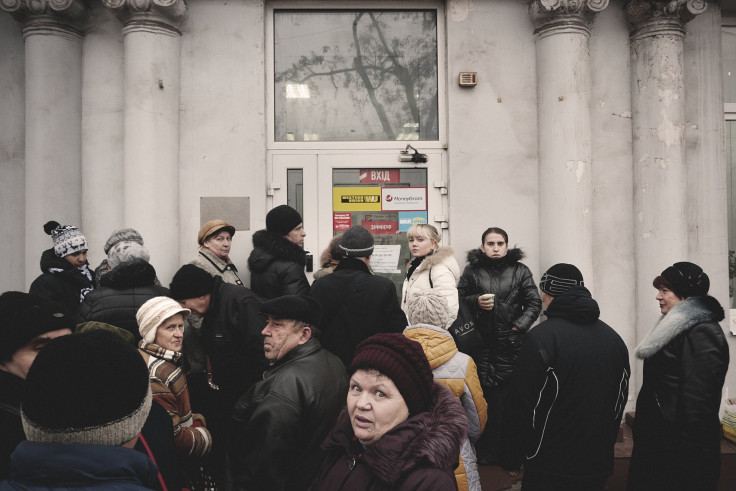On Eastern Ukraine's Front Lines, Strategic, Besieged Mariupol Faces Economic Destruction

MARIUPOL, Ukraine -- One year ago, Roman Sokolov’s purpose in life was his window-making business. Today, the 34-year-old entrepreneur spends every waking hour defending his hometown of Mariupol, a strategic Ukrainian seaport less than 30 miles (50 km) from the Russian border.
“When there’s a war, nobody needs new windows. We’ll wait until it’s over,” said Sokolov, who helps run Mariupol Defense, a group that coordinates volunteer organizations supporting the city’s defenders. “Now there’s a lull. But tomorrow it could start all over again.”
This gritty steel town of half a million has become the linchpin in Kiev government forces’ defense against the Kremlin-backed insurgency in eastern Ukraine. While a shaky ceasefire signed on Sept. 5 halted the separatists at the gates of the city, the front line is now just a few miles from Mariupol’s eastern outskirts. The only port in the disputed Donetsk region, Mariupol lies in the path of a possible land bridge connecting Russia with the Crimean peninsula, which Russian President Vladimir Putin annexed in March.
Although the conflict in eastern Ukraine is often portrayed as an uprising of the local Russian-speaking population, the struggle is much more drawn along socioeconomic lines. Here in Ukraine’s rust belt, everybody speaks Russian regardless of political affiliation.
The disagreement is really about whether Ukraine should align itself closer to the European Union or Russia. To the region’s workers and miners, who saw their living standards drop after Ukraine’s independence from the Soviet Union in 1991, Russia looks familiar and welcoming, while the EU is foreign and threatening. Many people saw the pro-EU protests in Kiev that toppled then-President Viktor Yanukovych in February as a coup that gave them the right to break away.
But for entrepreneurs like Sokolov or Galina Odnorog, a 46-year old food wholesaler who now collects jackets, boots and energy bars for Ukraine's ill-equipped army, secession from Kiev would mean a legal limbo that could destroy everything they built up.
Crimea was thrown into chaos after the Russian annexation, as the ruble was introduced, local banks shut and property rights were called into question. New U.S. and EU sanctions limit investment in the peninsula. Ukrainians who have something to lose view the rules and standards of the EU as a better guarantee for the future than Russian-style kleptocracy and international isolation.
Despite declarations of solidarity with their respective allies from Western capitals and Moscow, the people on the ground see little help from either side. The International Monetary Fund estimates that Ukraine will need an extra $15 billion to avoid financial collapse, but donors aren’t lining up to rescue an economy that has been gutted by decades of mismanagement and corruption, and almost a year of political turmoil and armed upheaval.
The rebel Donetsk and Luhansk regions, once Ukraine’s coal and steel powerhouse, are now detached from the rest of the country as rail connections have been severed and highways are dotted with checkpoints. In November, Ukrainian President Petro Poroshenko blocked government funding and bank services to areas under separatist control.
Mariupol is suffering. The city’s two gigantic steel mills, cut off from their supply chains, are working at 70 percent capacity, and cargo loadings at the port have fallen more than 40 percent, according to officials. Rinat Akhmetov, the plants' owner and Ukraine’s richest man, was slow to back the Kiev government, and now his Donetsk-based business empire is torn in half. Some people believe Akhmetov paid off the rebels not to seize Mariupol; others speculate that an outright takeover was called off by Moscow because it would have laid bare the extent of direct Russian military involvement.
“For rent” signs hang in shop windows along Lenin Prospekt, and the word “bomb shelter” is painted on sidewalks and buildings. The city hall and main police station are burnt-out shells, the result of street battles in the spring. The soccer team Ilyichyovets has moved to Dnipropetrovsk, 150 miles (250 km) away.
“This is all Kiev’s fault," said Alla Vasilenko, a pensioner from Donetsk who was huddled with other older women in front on their bank on Victory Prospekt. Because of liquidity problems, the bank has limited withdrawals to 300 Ukrainian hryvnias a day -- just $19. Since the beginning of the year, the hryvnia has lost half its value against the dollar.
Just up the road in an abandoned school, the volunteer Azov Battalion has set up its base. “They took everything from me. I don’t want to be ‘liberated’ by anyone,” Vasilenko said when two young Azov fighters passed by.
Their commander, an English-speaking, 26-year-old reserve officer who goes by the nom de guerre Kirt, dismissed charges that the Azov Battalion is a neo-Nazi paramilitary group. He is just for discipline and a strong government, said Kirt, who worked in the tourist industry in Thailand before returning to Ukraine. “People here still live in the bull**** of Soviet propaganda,” he said.
The greatest tragedy of the conflict may be that Ukrainians across the country, whether supporting Kiev or the separatists, are united in their main grievance: a system of crony capitalism that impoverished the population to the advantage of a few tycoons. Poroshenko himself, who was elected president after the ouster of Yanukovych, is an insider who amassed his fortune making chocolate.
“What has changed in Ukraine?” said a driver, who gave his name only as Vova. “One group of oligarchs chased out another. It’s clan warfare.”
Amid economic hardship and the possibility of renewed fighting, businessman Sokolov is looking forward to a chance to start rebuilding. “I saw how the rest of the world lives," said Sokolov, who traveled the world working as a steward for international cruise lines. "I want to change something. I want my child to live in a normal city and a normal country.”
© Copyright IBTimes 2024. All rights reserved.




















